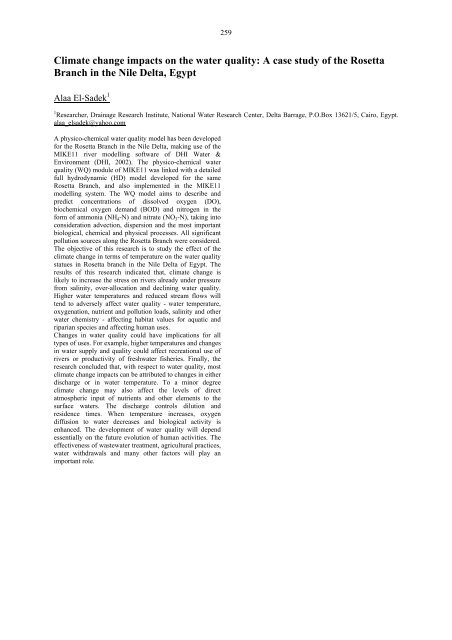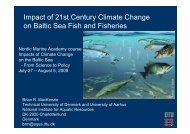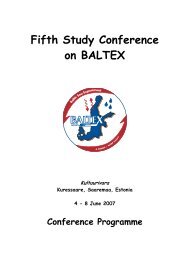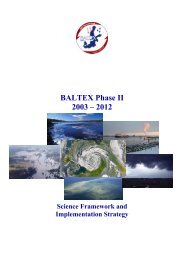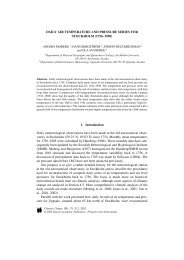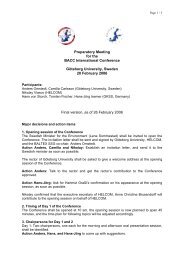Low (web) Quality - BALTEX
Low (web) Quality - BALTEX
Low (web) Quality - BALTEX
Create successful ePaper yourself
Turn your PDF publications into a flip-book with our unique Google optimized e-Paper software.
259<br />
Climate change impacts on the water quality: A case study of the Rosetta<br />
Branch in the Nile Delta, Egypt<br />
Alaa El-Sadek 1<br />
1 Researcher, Drainage Research Institute, National Water Research Center, Delta Barrage, P.O.Box 13621/5, Cairo, Egypt.<br />
alaa_elsadek@yahoo.com<br />
A physico-chemical water quality model has been developed<br />
for the Rosetta Branch in the Nile Delta, making use of the<br />
MIKE11 river modelling software of DHI Water &<br />
Environment (DHI, 2002). The physico-chemical water<br />
quality (WQ) module of MIKE11 was linked with a detailed<br />
full hydrodynamic (HD) model developed for the same<br />
Rosetta Branch, and also implemented in the MIKE11<br />
modelling system. The WQ model aims to describe and<br />
predict concentrations of dissolved oxygen (DO),<br />
biochemical oxygen demand (BOD) and nitrogen in the<br />
form of ammonia (NH 4 -N) and nitrate (NO 3 -N), taking into<br />
consideration advection, dispersion and the most important<br />
biological, chemical and physical processes. All significant<br />
pollution sources along the Rosetta Branch were considered.<br />
The objective of this research is to study the effect of the<br />
climate change in terms of temperature on the water quality<br />
statues in Rosetta branch in the Nile Delta of Egypt. The<br />
results of this research indicated that, climate change is<br />
likely to increase the stress on rivers already under pressure<br />
from salinity, over-allocation and declining water quality.<br />
Higher water temperatures and reduced stream flows will<br />
tend to adversely affect water quality - water temperature,<br />
oxygenation, nutrient and pollution loads, salinity and other<br />
water chemistry - affecting habitat values for aquatic and<br />
riparian species and affecting human uses.<br />
Changes in water quality could have implications for all<br />
types of uses. For example, higher temperatures and changes<br />
in water supply and quality could affect recreational use of<br />
rivers or productivity of freshwater fisheries. Finally, the<br />
research concluded that, with respect to water quality, most<br />
climate change impacts can be attributed to changes in either<br />
discharge or in water temperature. To a minor degree<br />
climate change may also affect the levels of direct<br />
atmospheric input of nutrients and other elements to the<br />
surface waters. The discharge controls dilution and<br />
residence times. When temperature increases, oxygen<br />
diffusion to water decreases and biological activity is<br />
enhanced. The development of water quality will depend<br />
essentially on the future evolution of human activities. The<br />
effectiveness of wastewater treatment, agricultural practices,<br />
water withdrawals and many other factors will play an<br />
important role.


